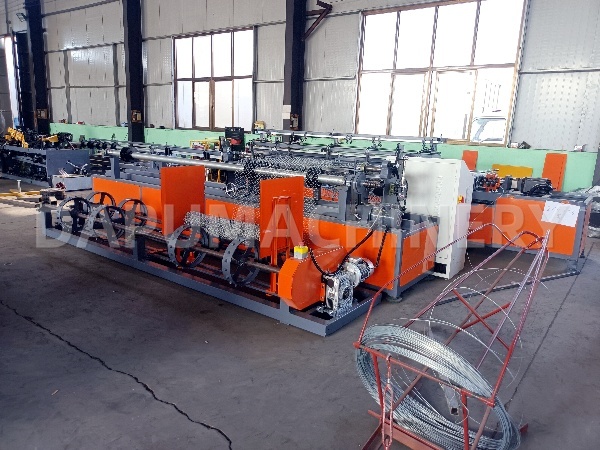
Most Trusted Chain Link Fencing Machines in Africa, Middle East & South America
Category:News
Author:
Source:
Add time:2025-04-24 11:47
Across Africa, the Middle East, and South America, chain link fencing is a lifeline for industries ranging from agriculture and mining to urban development and security. However, these regions face unique challenges—unpredictable power grids, corrosive climates, and the need for scalable, cost-effective solutions. Choosing a trusted fencing machine brand is not just about production speed; it’s about reliability, adaptability, and long-term value. In this article, we highlight DAPU’s chain link fencing machines, renowned for their durability and regional customization, and explore why they dominate markets in these high-growth regions.

Why Trust Matters in Emerging Markets
For businesses in Africa, the Middle East, and South America, equipment failure or inefficiency can derail projects and damage reputations. Trusted machines must:
Withstand harsh environments (desert heat, coastal salt, heavy rains).
Operate reliably under unstable power conditions.
Adapt to diverse project scales (small farms to mega infrastructure).
Reduce long-term costs through energy efficiency and minimal maintenance.
DAPU’s machines, including the DP 25-85, DP 20-100, and DP 20-100P, are engineered to meet these demands. Below, we break down their regional success stories.
1. Africa: Power Resilience and Rugged Performance
Key Challenges:
Frequent power outages (e.g., Nigeria, Kenya).
Wildlife threats and vandalism in remote areas.
Budget constraints for small-scale projects.
DAPU’s Trusted Solution: DP 20-100P Dual-Motor Machine
Dual-Motor Design: Ensures stable operation during voltage fluctuations, critical for Tanzanian mining sites or rural Ugandan farms.
Wide Wire Range (1.5–4.5 mm): Builds fences strong enough to deter elephants in Kenyan game reserves or secure copper mines in Zambia.
Scalable Output (80–260 m²/h): From fencing small villages to large industrial zones, one machine handles it all.
Case Study:
A Nigerian contractor used the DP 20-100P to produce 4.5 mm thick fences for a Lagos housing estate. Despite daily power cuts, the dual motors maintained production, completing the project 20% faster than competitors using single-motor machines.
2. Middle East: Corrosion Resistance and Mega-Project Demands
Key Challenges:
Extreme heat and coastal corrosion (e.g., UAE, Saudi Arabia).
Ultra-wide fencing needs for highways, airports, and solar farms.
High-security requirements for oil and gas facilities.
DAPU’s Trusted Solution: DP 20-100 Double-Wire Feed Machine
6,000 mm Maximum Width: Minimizes joints for seamless barriers around Dubai’s Expo City or Saudi Arabia’s NEOM project.
PVC-Coated Wire Compatibility: Resists salt corrosion in Qatar’s coastal industrial zones.
Reinforced Double-Wire Design: Creates tamper-proof fencing for sensitive sites like Omani oil refineries.
Case Study:
A Saudi contractor producing fencing for a Red Sea solar farm chose the DP 20-100 for its ability to weave 6,000 mm-wide PVC-coated mesh. The result? A 30% reduction in installation time and zero rust issues after 18 months.
3. South America: Speed and Versatility for Diverse Terrains
Key Challenges:
Rapid deployment for agricultural and urban projects (e.g., Brazil, Colombia).
Durable fencing for mountainous or flood-prone areas.
Cost-effective customization for tight budgets.
DAPU’s Trusted Solution: DP 25-85 Single-Wire Feed Machine
High-Speed Output (120–180 m²/h): Ideal for fencing Brazilian soybean farms or Peruvian mining camps.
Thick Wire Capacity (1.8–4 mm): Withstands landslides in Colombia’s Andes region or livestock pressure in Argentine ranches.
Adjustable Mesh Length: Reduces material waste for irregularly shaped plots in Chile’s urban expansions.
Case Study:
A Colombian contractor used the DP 25-85 to enclose a 50-hectare coffee plantation in mountainous terrain. The machine’s adjustable settings allowed precise mesh lengths, cutting wire waste by 15% compared to fixed-length systems.
The DAPU Advantage: Built for Regional Trust
1. Customization Without Compromise
DAPU machines can be tailored to:
Wire Diameter: Switch between 1.5 mm for cost-sensitive residential projects and 4.5 mm for high-security needs.
Mesh Openings (25–100 mm): Create anti-climb fences (25 mm) for South African prisons or wider gaps (100 mm) for Brazilian cattle grids.
Material Blends: Combine galvanized and PVC-coated wires for hybrid durability in Ecuador’s humid coastal regions.
2. Energy Efficiency = Lower Operating Costs
The DP 20-100P’s dual motors optimize power use, saving up to 25% on energy bills in countries like Angola with high electricity costs.
Automated systems reduce labor dependency, critical in regions facing skilled worker shortages.
3. Local Support Networks
DAPU partners with regional distributors to provide:
On-site training for machine operators in Kenya, Egypt, and Bolivia.
Rapid spare parts delivery to minimize downtime in remote areas.
Regional Comparison: Matching Machines to Markets
| Region | Top Challenge | Trusted DAPU Model | Why It Wins |
|---|---|---|---|
| Africa | Power instability | DP 20-100P Dual-Motor | Dual motors handle outages; scalable output. |
| Middle East | Corrosion & mega-projects | DP 20-100 Double-Wire | 6,000 mm width; PVC-coated wire support. |
| South America | Speed & terrain diversity | DP 25-85 Single-Wire | High-speed production; thick wire capacity. |
Conclusion
In Africa, the Middle East, and South America, DAPU’s chain link fencing machines have earned trust by solving region-specific pain points head-on. Whether it’s powering through blackouts in Nigeria, resisting Saudi Arabia’s corrosive coasts, or speeding up Brazil’s agricultural expansions, these machines deliver reliability, adaptability, and ROI. For businesses aiming to lead in these dynamic markets, investing in DAPU isn’t just a choice—it’s a strategic edge.
Recommend News




